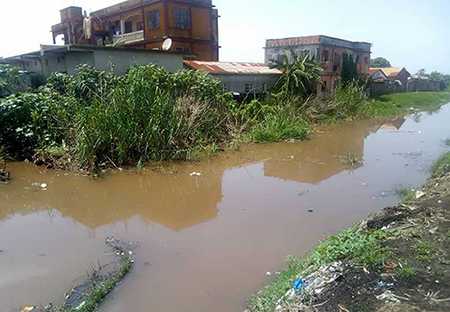They have been quiet residents of Gambia’s island capital for generations, but the wild crocodiles inhabiting Banjul’s marshland have been steadily growing and encroaching on human habitations in recent years to the general disquiet of city dwellers.
This has caused serious concern even panic among residents who are not prepared to trust that the beasts living in the marshes will not pose any genuine danger to the community of Tabacco Road and Box Bar, in the north of the island.
Although there has never been a mauling by the crocs of humans living in the city, people are growing increasingly uncomfortable with frequent sightings of the animals in and around living spaces, foraging for foods thrown in gutters and gullies that have for ages stopped serving their real purpose.
Therefore Banjulians especially those living in the north of the island city are not taking chances with the unpredictable beasts on two legs.
The crocodiles have gone from being an innocuous fact of life for residents of Box Bar and Tabacco Road to animals whose presence they can no longer take for granted.

Located in a bushy and swampy neighborhood, Tabacco Road appears to be one of the most neglected areas of the capital.
Occupied by slum-like dwellings and other complexes served by inadequate and poorly managed drainage infrastructures, the neighborhood is highly prone to not only encroachment by wild animals such as crocodiles but inundations from rain and water flowing the Atlantic Ocean with no drainage system in the real sense.
Kalilu Kassama, a concerned resident of Tabacco Road, tells the African Press Agency that the crocs are frequently spotted at a canal that runs through the neighborhoods and empties its waters to the Bund Road riverside from the main city center Banjul.
“They seem to be everywhere these days and I see them even at night” he points out.
He says the crocodiles show up on the green grasslands fronting the swampy waters a few metres away from people’s homes.
Children of the area chase the wild crocodiles whenever they come out of the water and this for Kassama is a real concern.
“We are always on the alert due to the presence of these crocodiles” he adds.
Residents believe the Department of Parks and Wildlife should consider moving the animals away before they cause damage to the Tabacco Road and Box Bar communities especially children who usually play football in the area around the swamps infested by crocodiles.
“A tall wall could be erected on both sides of the canal to prevent the crocodiles from moving on homes in search of food” says one resident who begged for anonymity.
“Sometimes we consider attacking and killing them before they start mauling us but we realise that this could be a crime under the law” he says.
“But our safety as human beings trumps all other consideration” he adds.
Some children who claim seeing the crocodiles several times during the day throw stones at them if they come too close to human settlements. Octogenarian Oumie Jaw, who has lived in the Tabacco Road neighborhood for over 30 years, the wild animals have multiplied exponentially and outgrew their original habitat.
“I once found a crocodile lying near my water-tap when I was preparing to perform ablution for the early morning prayers” the elderly woman says with fear ringing in her voice.
“I was even alerted by my eldest son and we had to literally chase it back to the canal” she explains.
The old woman warns that crocs should be relocated before they start hunting humans down for food.
Isatou Ceesay who moved to the area ten years ago says although she has never seen the crocs, it is just a matter of time before she would encounter them.
“As a mother it is worrying for me and many like me since our kids use their area as a playground” she adds.
This is a concern shared by the Principal of the Garba Jahumpa Upper Basic School.
“I have never seen any living crocodile in this area but we don’t have to see them to realise that they pose a real danger to my students perhaps more than any other group of people” Mr John Mendy opines to APA.
In The Gambia, it is not the stuff of myths that crocodiles live with humans without incident.
In the coastal towns of Bakau (12km) and Kartong 64 km south of Banjul, crocodiles interact with the communities and have been attractions for tourists to the country every season.
It is the norm for tourists to take selfies with the crocodiles of Katchikally in Bakau and those of Kartong without any fuss.

However, Ousman Sillah, the MP for Banjul North, where the animals have built a colony, is under no illusion about the wild crocodiles of the capital and prefers to err on the side of caution for the people living in his constituency.
Sillah has been very swift on the uptake by contacting the Department of Parks and Wildlife for advice and action.
Teams from the department were dispatched to the area to assess the danger the crocodiles pose to humans and what can be done to prevent this.
In a statement Sillah had suggested to the Department of Parks and Wildlife that the crocodiles be relocated to a sanctuary or be confined in a safe place, to avert any threat to people’s lives.
“If it is to serve as a tourist attraction site, they should be confined to an area so that they don’t pose any threat to people” Sillah advises.
He says moving them away will stop the reptiles pushed into the city by floodwaters in the future.
DB/as/APA


